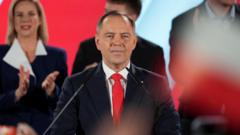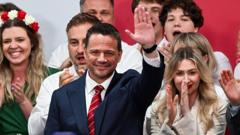Ukrainian refugees, once welcomed with open arms in Poland, are now facing increasing bullying, harassment, and xenophobia, sparking fear and frustration within their communities.
**Rising Anti-Ukrainian Sentiment: Polish Refugees Face Discrimination as Support Fades**

**Rising Anti-Ukrainian Sentiment: Polish Refugees Face Discrimination as Support Fades**
As Poland grapples with escalating anti-Ukrainian sentiment, refugees share experiences of abuse and discrimination amid a tense political landscape.
In Poland, where over 2.5 million Ukrainians reside, the atmosphere has shifted dramatically for many refugees. Svitlana, a Ukrainian mother, recalls how her daughter, who was once happy in her new school, now faces bullying and derogatory remarks like “Go back to Ukraine.” This rising tide of anti-Ukrainian sentiment has resulted in increased reports of abuse on public transport and within schools, compounded by a polarizing presidential election campaign that has reignited tensions.
"In the beginning, the Polish people offered so much support," recounts Natalia Panchenko, an activist leading the 'Stand with Ukraine' Foundation. "But recently, we have seen a troubling rise in public hostility." Many Ukrainians say they feel unwelcome and are contemplating returning home due to the worsening atmosphere. Official statistics reveal a drop in support for Ukrainian refugees, with only 50% of Poles currently in favor of offering refuge, compared to 81% just two years ago.
Political dynamics play a significant role in shaping these sentiments. Candidates in the upcoming elections are navigating a fine line, maintaining pro-Ukrainian rhetoric while also responding to the growing negative sentiment among constituents. The far-right candidate Slawomir Mentzen has been outspoken against Ukrainian refugees, while others like Rafal Trzaskowski have tempered their pro-Ukrainian messages to appeal to the centrist vote.
Disinformation campaigns are further fueling anti-Ukrainian feelings, with targeted narratives depicting Ukrainians as burdens on Polish society. Michal Marek, who tracks such propaganda, warns that these dangerous messages are increasingly resonating with the populace, potentially changing the political landscape. As the election approaches, ordinary Poles grapple with the complex realities of migration, political propaganda, and the humanitarian crisis next door.
"In the beginning, the Polish people offered so much support," recounts Natalia Panchenko, an activist leading the 'Stand with Ukraine' Foundation. "But recently, we have seen a troubling rise in public hostility." Many Ukrainians say they feel unwelcome and are contemplating returning home due to the worsening atmosphere. Official statistics reveal a drop in support for Ukrainian refugees, with only 50% of Poles currently in favor of offering refuge, compared to 81% just two years ago.
Political dynamics play a significant role in shaping these sentiments. Candidates in the upcoming elections are navigating a fine line, maintaining pro-Ukrainian rhetoric while also responding to the growing negative sentiment among constituents. The far-right candidate Slawomir Mentzen has been outspoken against Ukrainian refugees, while others like Rafal Trzaskowski have tempered their pro-Ukrainian messages to appeal to the centrist vote.
Disinformation campaigns are further fueling anti-Ukrainian feelings, with targeted narratives depicting Ukrainians as burdens on Polish society. Michal Marek, who tracks such propaganda, warns that these dangerous messages are increasingly resonating with the populace, potentially changing the political landscape. As the election approaches, ordinary Poles grapple with the complex realities of migration, political propaganda, and the humanitarian crisis next door.




















